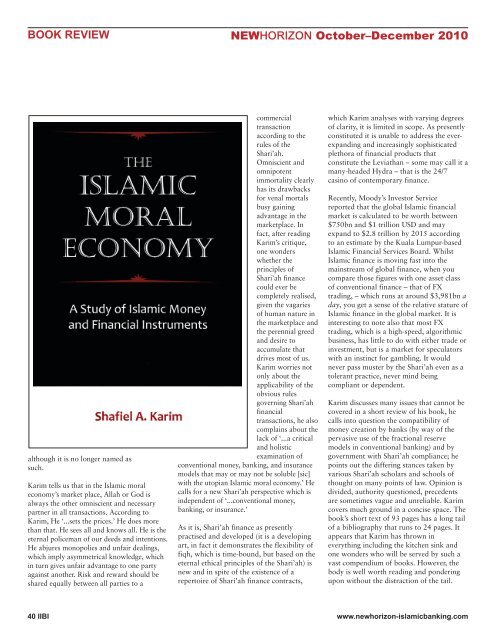NEWHORIZON
NEWHORIZON - Institute of Islamic Banking and Insurance
NEWHORIZON - Institute of Islamic Banking and Insurance
- No tags were found...
Create successful ePaper yourself
Turn your PDF publications into a flip-book with our unique Google optimized e-Paper software.
BOOK REVIEW<br />
<strong>NEWHORIZON</strong> October–December 2010<br />
although it is no longer named as<br />
such.<br />
Karim tells us that in the Islamic moral<br />
economy’s market place, Allah or God is<br />
always the other omniscient and necessary<br />
partner in all transactions. According to<br />
Karim, He ‘...sets the prices.’ He does more<br />
than that. He sees all and knows all. He is the<br />
eternal policeman of our deeds and intentions.<br />
He abjures monopolies and unfair dealings,<br />
which imply asymmetrical knowledge, which<br />
in turn gives unfair advantage to one party<br />
against another. Risk and reward should be<br />
shared equally between all parties to a<br />
commercial<br />
transaction<br />
according to the<br />
rules of the<br />
Shari’ah.<br />
Omniscient and<br />
omnipotent<br />
immortality clearly<br />
has its drawbacks<br />
for venal mortals<br />
busy gaining<br />
advantage in the<br />
marketplace. In<br />
fact, after reading<br />
Karim’s critique,<br />
one wonders<br />
whether the<br />
principles of<br />
Shari’ah finance<br />
could ever be<br />
completely realised,<br />
given the vagaries<br />
of human nature in<br />
the marketplace and<br />
the perennial greed<br />
and desire to<br />
accumulate that<br />
drives most of us.<br />
Karim worries not<br />
only about the<br />
applicability of the<br />
obvious rules<br />
governing Shari’ah<br />
financial<br />
transactions, he also<br />
complains about the<br />
lack of ‘...a critical<br />
and holistic<br />
examination of<br />
conventional money, banking, and insurance<br />
models that may or may not be soluble [sic]<br />
with the utopian Islamic moral economy.’ He<br />
calls for a new Shari’ah perspective which is<br />
independent of ‘...conventional money,<br />
banking, or insurance.’<br />
As it is, Shari’ah finance as presently<br />
practised and developed (it is a developing<br />
art, in fact it demonstrates the flexibility of<br />
fiqh, which is time-bound, but based on the<br />
eternal ethical principles of the Shari’ah) is<br />
new and in spite of the existence of a<br />
repertoire of Shari’ah finance contracts,<br />
which Karim analyses with varying degrees<br />
of clarity, it is limited in scope. As presently<br />
constituted it is unable to address the everexpanding<br />
and increasingly sophisticated<br />
plethora of financial products that<br />
constitute the Leviathan – some may call it a<br />
many-headed Hydra – that is the 24/7<br />
casino of contemporary finance.<br />
Recently, Moody’s Investor Service<br />
reported that the global Islamic financial<br />
market is calculated to be worth between<br />
$750bn and $1 trillion USD and may<br />
expand to $2.8 trillion by 2015 according<br />
to an estimate by the Kuala Lumpur-based<br />
Islamic Financial Services Board. Whilst<br />
Islamic finance is moving fast into the<br />
mainstream of global finance, when you<br />
compare those figures with one asset class<br />
of conventional finance – that of FX<br />
trading, – which runs at around $3,981bn a<br />
day, you get a sense of the relative stature of<br />
Islamic finance in the global market. It is<br />
interesting to note also that most FX<br />
trading, which is a high-speed, algorithmic<br />
business, has little to do with either trade or<br />
investment, but is a market for speculators<br />
with an instinct for gambling. It would<br />
never pass muster by the Shari’ah even as a<br />
tolerant practice, never mind being<br />
compliant or dependent.<br />
Karim discusses many issues that cannot be<br />
covered in a short review of his book, he<br />
calls into question the compatibility of<br />
money creation by banks (by way of the<br />
pervasive use of the fractional reserve<br />
models in conventional banking) and by<br />
government with Shari’ah compliance; he<br />
points out the differing stances taken by<br />
various Shari’ah scholars and schools of<br />
thought on many points of law. Opinion is<br />
divided, authority questioned, precedents<br />
are sometimes vague and unreliable. Karim<br />
covers much ground in a concise space. The<br />
book’s short text of 93 pages has a long tail<br />
of a bibliography that runs to 24 pages. It<br />
appears that Karim has thrown in<br />
everything including the kitchen sink and<br />
one wonders who will be served by such a<br />
vast compendium of books. However, the<br />
body is well worth reading and pondering<br />
upon without the distraction of the tail.<br />
40 IIBI www.newhorizon-islamicbanking.com
















